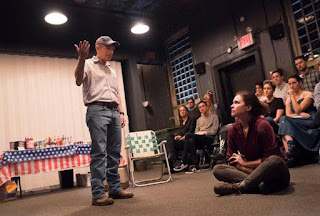Theater Review: Exciting Drama from America’s Heartland
Lewiston/Clarkston
Written by Samuel D. Hunter
Directed by Davis McCallum
Rattlestick Playwright’s Theater, Manhattan
October 28, 2018
Playwright Samuel D. Hunter (b. 1981) is an Idaho explant now
resident in NYC. His award winning The Whale
and many of his other plays are personal dramas set in Idaho or similar Western
locales. His keen eye for rural people and intergenerational conflict is timely
in our re-examination of city vs. country in the Trump era. The small scale
plays (3 characters each) Lewiston and Clarkston (2015-16) were presented together
in gripping productions off Broadway this fall. Each play was 70-80 minutes
long, and there was a “communal dinner” in between (an odd folksy juxtaposition
of Manhattanites, either eating BBQ or tofu!). The setting was really great;
the regular theater was gutted to create a bleak, small church auditorium with
shabby furnishings, folding chairs, and stacked Costco boxes of Cheesy Poofs
all around…we could have been anywhere in a hard-up community in rural US, but
were actually in the trendy West Village in close proximity to the action.
I love it when producers pick a performance
site that amplifies the drama. The names of the plays connote several meanings.
Literally, these are the two towns in which the plays are set. The towns are
(in fact) across the Snake River from each other, one in Washington, the other
in Idaho. Each has 7,000-20,000 residents, and each survives on light industry
and working-class jobs. The other name reference is to Lewis and Clark, the US
explorers who stopped near here on the way to the Pacific, seeking the source
of the Colombia river. These are referenced during both plays, as a couple of
the characters are distant relatives of the explorers. The metaphor allows the
playwright to compare these young peoples’ dissatisfaction or stuck-ness with
the explorers’ ambition and often-insane risk taking. Each play focuses on a dissatisfied millennial seeking some sort
of escape or spiritual center in these humdrum towns. In the first play Lewiston, a young woman, tired of “urban
farming” in Seattle, backpacks into her Idaho birthplace to try to convince her
flinty grandma to not sell the family property. The two are oil and water, and
the play’s focus is how each one misreads and judges the other. Family does end
up winning out, to a degree, but the playwright is not a sentimentalist, and
reality is always nearby. There’s a not-so-revealing subplot involving grandma’s
live-in guy, who it turns out is just camping there while trying to be a gay
man in a small town. The shabby fireworks stand that is grandma’s source of
income is a nice metaphor for American values gone to seed.
The play might seem
a bit insubstantial if it were not a lead in for the more visceral Clarkston. Here, another wandering millennial
(funny Noah Robbins), here a frail, nudgy post-colonial gender studies major from
Bennington College (!), flees his secure east coast roots and runs out of gas in
Clarkston, where he takes a job in the Costco working stocking shelves with the
hunky blonde local guy (a terrific Edmund Donovan). This is a wonderful play,
where the playwright does not allow us to fall into predictable stereotypes. Urban
X talks a good line, but is neurotic and shallow, while rural gay repressed Y doesn’t
talk much, but is deep, as we gradually find out. The playwright interweaves
themes of urban torpor, depression, millennial angst, and coached optimism in a
subtle and complex way. For example, the easterner is a very open gay young
man, but neurotic about actual sex, while the Idahoan is repressed and closeted
about his homosexuality, but very willing to have gay sex. From some personal family
experience, this rural character rang quite true, as did his slow-cadenced speech
that often hides deeper pain and meaning in platitudes and cynicism. The two
end up being a complex, loving, and somewhat inscrutable pair.
Overlying all this
(and the first play too) is death, most overtly in X’s fatal neurodegenerative diagnosis
of Huntington’s Disease, and in constant references to suicides, overdoses,
etc. This gives these two 3-character rural dramas a Shakespearean/O’Neill-like
gravitas strikingly at odds with the Costco merchandise-laden set. I admire the playwright's refusal to resort to melodrama. His dialogue is understated, and he has a way of setting us up for a big climax (e.g. the two boys, like Lewis and Clark, together finally seeing the Pacific ocean, each for the first time) then having it not amount to all that much, much as occurs in life. Finding
tragedy in average America is hardly new to movies or theater, but this
playwright does it with exceeding craft and guile. Neither play quite ended as I
thought it would, and both made me reflect about life. See these plays if they
come to your area!


Comments
Post a Comment